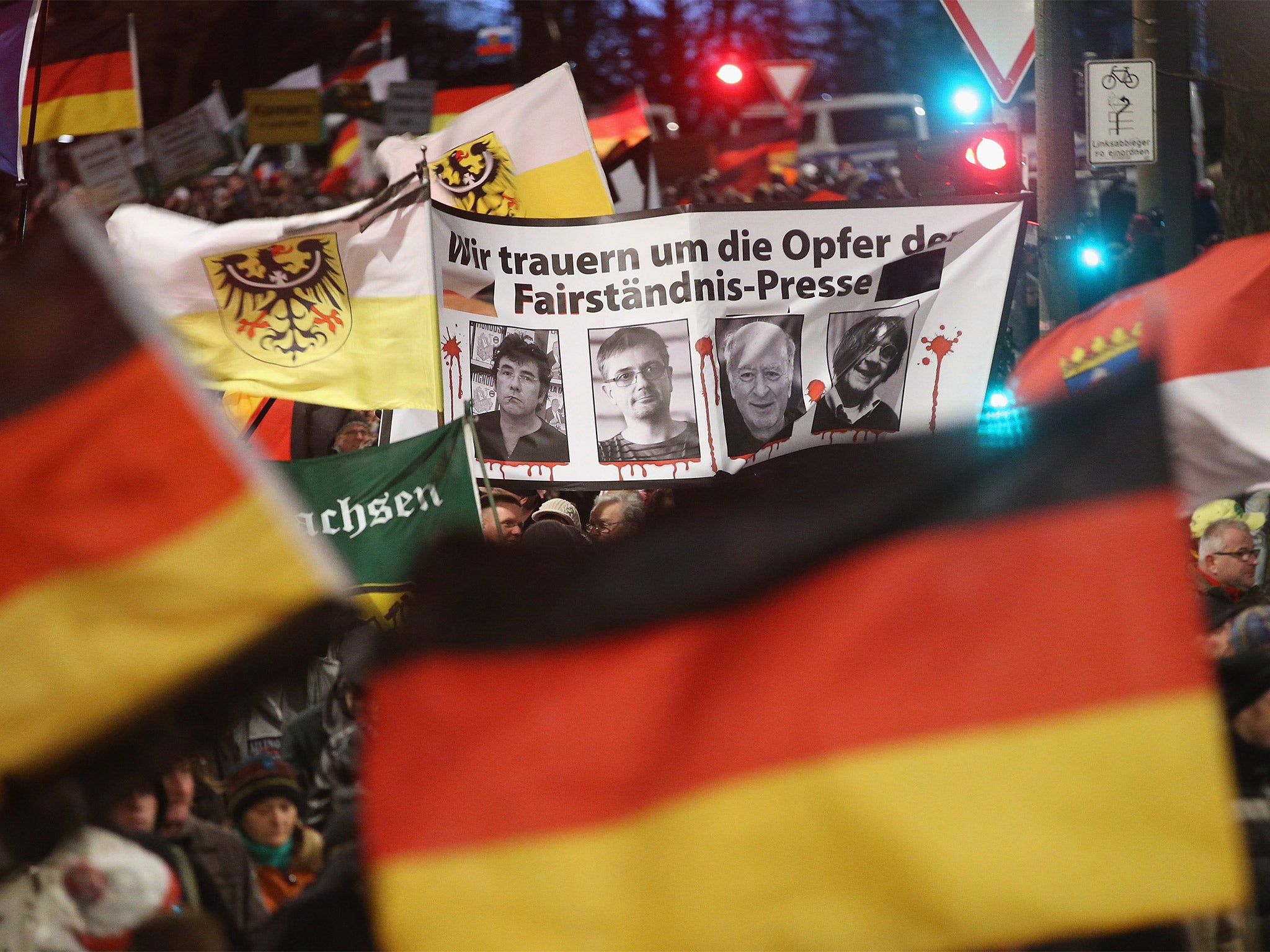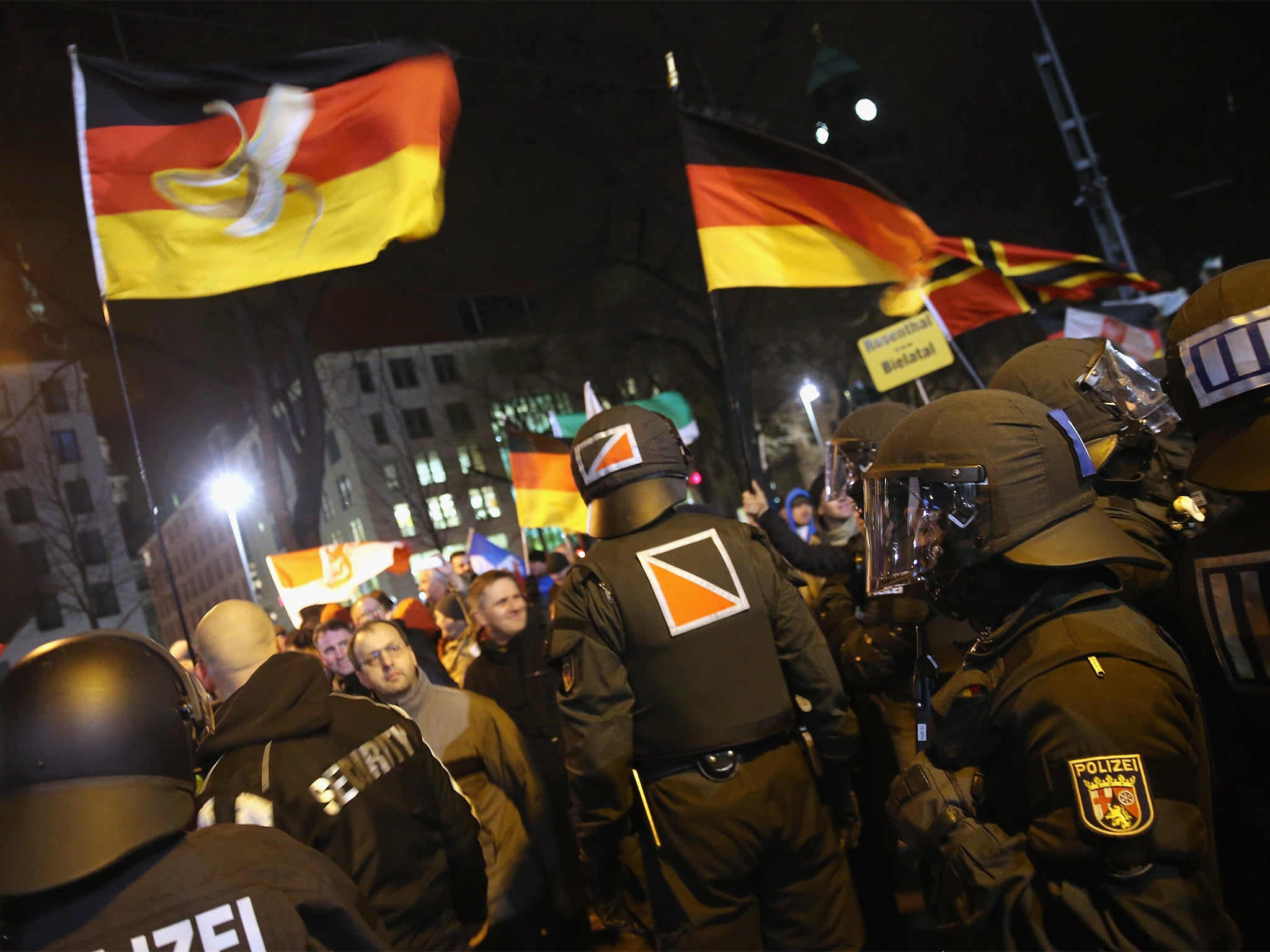Pegida movement's marches attract thousands as hatred of Islam and immigrants sweeps across Germany in the wake of Paris attacks
The body of a dead Eritrean has been discovered in Dresden, while a hotelier has been forced to abandon plans to open an asylum-seeker hostel after internet campaign

The controversial anti-Islamic Pegida movement and terror attacks in neighbouring France have polarised Germany, bringing thousands on to the streets in protest against racism and in support of press freedom. But there are disturbing signs that anti-immigrant xenophobia is on the increase.
An estimated 100,000 people took to the streets across Germany on Monday to show their support for the victims of the attack on the French satirical magazine Charlie Hebdo and to condemn intolerance. But the anti-Islamic Pegida movement rallied a record 25,000 supporters in Dresden and there are to be more Pegida marches in Cologne.
Chancellor Angela Merkel and Germany’s President Joachim Gauck have been among the first to condemn the Charlie Hebdo attacks outright and dismiss Pegida – which stands for “Patriotic Europeans against Islamisation of the Occident” – as a movement followed by those with “hatred in their hearts”.
Despite condemnation from Germany’s political leaders, anti-immigrant xenophobia plunged to new depths today with disclosures that a Dresden hotelier had been forced to abandon plans to open an asylum-seeker hostel after being mobbed on the internet and seeing his property daubed with racist graffiti.
Kahlid I. was said to have been last seen at 8pm on Monday. A mass demonstration attended by 25,000 Pegida supporters in Dresden was drawing to a close at the time. Kahlid I. lived in a Dresden apartment block together with 20 other asylum-seekers. They had told the city’s Morgenpost newspaper they feared the city’s Monday night rallies. “People treat us like enemies, there is hate in their eyes, we don’t dare go out, we need protection,” one of the asylum-seekers had said.
Reports of the suspicious circumstances surrounding Kahlid I.’s death coincided with an announcement by the Dresden authorities that the owner of the city’s Prinz Eugen hotel had planned to convert his property into accommodation for 94 asylum-seekers but had dropped the idea after angry protests.
“The hotel owner made the surprise decision to withdraw,” a statement from the city government said. “He said he did so because of massive opposition from residents.”
It was reported that some 5,700 people had signed an internet petition opposing the asylum hostel project, claiming that it was “pre-destined for conflict”.
The hotel was also said to have been smeared with racist slogans against asylum-seekers. “It sends the wrong message when a responsible citizen backs down like this because of pressure and fear,” said Jens Hoffsommer, a Green Party spokesman.
The decision to abandon the hostel project was the latest response to growing anti-immigrant and anti-Islamic xenophobia in Germany which has erupted as authorities struggle to accommodate 200,000 asylum-seekers taken in during 2014. More are expected this year.
In early December, new accommodation destined for asylum-seekers near Nuremberg was firebombed and daubed with racist slogans.
In October, The Independent reported on the case of a hotel owner from Bautzen, near Dresden, who had converted his hotel into a hostel for refugees from Syria to meet a growing demand for asylum-seeker accommodation.
The owner described how his asylum-seekers were ostracised by townspeople when they went shopping and how violent racist protests by locals had obliged him to erect a fence topped with razor wire around his property to protect the residents.
Pegida was launched in Dresden in October last year and attracted just 150 supporters at its first Monday evening rally. On Monday this week, supporters from all over Germany attended the movement’s Dresden rally despite calls to stay away from politicians and disclosures that the movement used slogans such as “Lügenpresse” – Liar press – that were regularly used by Hitler’s Nazi Party.
There were also several copycat Pegida rallies in other major provincial towns and cities, but which failed to attract as much support. In Cologne, the authorities protested by switching off the floodlights for the city’s famous Gothic cathedral.
There have been conflicting accounts about the attitudes and backgrounds of Pegida’s supporters. They are said to include both convinced neo-Nazis and impoverished pensioners who feel that they are the losers of Germany’s 1990 reunification.

However, a study conducted by Dresden’s Technical University concluded, alarmingly, that the average Pegida protester was well-educated and middle-class. They attended protests because they were “dissatisfied with politics”, according to the study.
Chancellor Merkel and the political mainstream remain bound by conviction and Europe’s 20th-century past to declare that Germany should provide asylum for refugees in need.
As a result Pegida’s has been politically sidelined by all but the country’s new eurosceptic and increasingly anti-immigrant Alternative for Germany’s Party (AfD).
The difficult predicament faced by Germany as it attempts to house a growing population of asylum-seekers came under the spotlight today after revelations that authorities planned to house a group of 20 refugees in barracks that once served as a satellite camp for Buchenwald Nazi concentration camp, where more than 50,000 prisoners died in the Second World War. Refugee support groups called the plan tasteless and alarming.